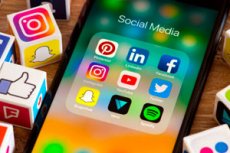Social media linked to nightmares, mental health and sleep quality
最近審查:14.06.2024

The more time you spend on social media, the more likely you are to experience unpleasant social media-related dreams, which can cause anxiety, disrupt sleep, and affect your peace of mind.
Reza Shabahang from Flinders University argues that the widespread and rapid spread of social networks can influence various aspects of life, including the realm of dreams.
“As social media becomes more intertwined with our lives, its influence extends beyond our waking hours and can influence our dreams,” says Shabahang of the College of Education, Psychology and Social Work.
Shabahang has developed a new scale, the Social Media Nightmare-Related Scale (SMNS), which can quantify how social media can contribute to nightmares.
The SMNS was developed by integrating the literature on dreams, nightmares and the relationship between media and dreams, with a focus on specific topics related to social media use, such as helplessness, loss of control and victimization.
Article "Social Media Nightmares - A Possible Explanation for Poor Sleep Quality and Low Emotional Well-Being in the Age of Social Media?" was published in BMC Psychology.
"Our research introduces the concept of social media nightmares, which are defined as nightmares involving social media-related topics such as cyberbullying, online hate, or excessive use of social media," says Shabahang.
"Although social media-related nightmares are relatively rare, those who use social media more often in their daily lives are more likely to experience such nightmares, which are associated with negative mental health effects such as anxiety, depression and sleep quality.
“This study provides insight into the complex relationships between social media use, mental health and sleep quality,” he adds.
Shabahang warns that as the technology landscape evolves, it is necessary to continue to explore the impact of social networks on users' dream experiences.
"With the rapid development of technology and media, including artificial intelligence (AI) and virtual reality, and the increasing dependence on and deep integration of these technologies, dreams with technological and media content can be expected to become increasingly common. " he says.
"Future research has the potential to expand the scope of this research by delving into areas such as nightmares associated with the supposed dangers of AI.
“To reduce the incidence of social media nightmares, we recommend using social media responsibly and mindfully,” he adds.

